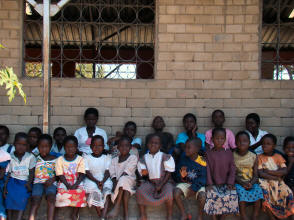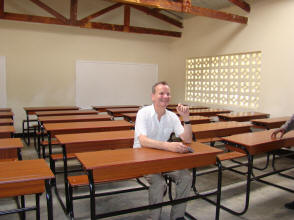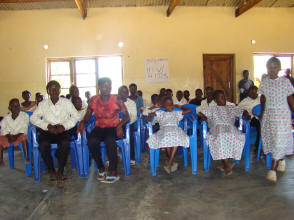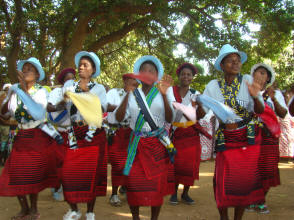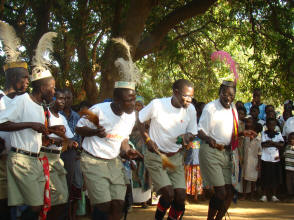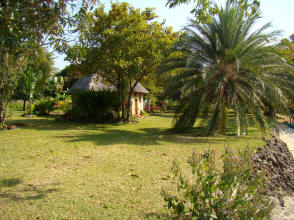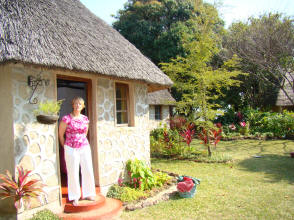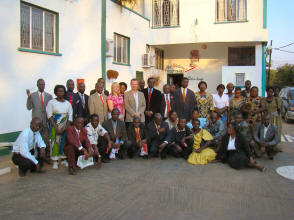Malawi and more
Last week I was in Malawi – working
(not that that stopped me enjoying
the time I had there). I was on a
Westminster Foundation for Democracy
visit, helping Malawian politicians
build campaigning skills and
political engagement along with one
of our MPs, Pete Wishart.
I was
surprised at some of the differences
between politics here and politics
there. Malawian MPs tend to be the
driving force behind community
activity and their local party
organisation takes the place to a
great extent of institutions like
community councils and tenants
organisations.
One
thing which has left a lasting
impression on me and which I believe
has changed my perception of Malawi
is the incredible poverty. Before
this trip I had, of course, heard
about the poverty in many African
countries over and over again but
nothing prepared me for actually
coming hard up against the reality
of it.
The
normal life for the majority of
people, from those I encountered at
least, was subsistence living,
getting by from day to day, little
planning for the future simply
because you don’t have time to plan
for tomorrow when you’re busy trying
to find food for today.
There’s good news coming, though, in
the shape of the Malawian MP who was
our host, Aleke Banda, the President
of the People’s Progressive
Movement. He has been instrumental
in bringing in funding for some
localised projects which have the
potential to deliver some excellent
results.
There
is, for example, EU funding en route
for irrigation projects, there are
co-operative farming projects
starting up with different
communities specialising in
different food products in order to
maximise yield. The difficulty they
continue to face is the utter
destruction of crops by inclement
weather – an unpredictable and
sometimes vicious enemy. That said,
encouraging the trade between
communities is helping to rebuild
the idea of community and
cross-community cooperation.
There’s also an organisation – a
charity – known as Mary’s Meals
which provides food for children to
allow them to go to school without
having to worry about getting fed.
It’s not a complete solution, but it
does move things in the right
direction – there’s a far higher
take-up of primary education now
than there was before Mary’s Meals
got going. Secondary education is
still a bit sparse, mainly because
of a lack of secondary schools, it
must be said, but there are
vocational training centres
beginning to show up. You can read
more about Mary’s Meals on the
charity’s website at
http://www.marysmeals.org/
Health issues are also a concern.
I’m sure you won’t be surprised to
hear that AIDS is still a major
killer in Malawi, leaving thousands
of orphans – many of whom are
infected with the virus before they
are born. It’s an issue that has to
be addressed on a global level, but
it hits you hard when you come face
to face with those orphans and
realise the kind of future that many
of them and many of their
communities will be facing.
Education will be important,
provision of drugs at less than the
prices charged in the western world
will be important, and some culture
change to allow people to have the
self-confidence to take control of
their own lives and take decisions
about their own lives will be
important.
What is certain, though, is that we
cannot sit here in our comfort,
surrounded by the wealth that
cushions Western Europe and the USA,
preaching to the people of Malawi
about how they should live their
lives and organise their
communities. We can offer help and
provide support where possible, but
the decisions will have to be made
in Malawi.
I’ve
enclosed a few pictures here. I’m
sure you’ll notice that the poverty
doesn’t mould the people; that they
rise above it and get on with life.
The beach hut you see is actually
the hotel I was staying in – the
country is gorgeous. Pete took some
photographs as well and he’s
promised to send me them, so I’ll
see if there are more we can put up
next week.
Back
home and back into Parliament –
committees and chamber, including
the debate on whether Wendy
Alexander should bear the sanction
decided by the Standards Committee.
There was also some important work
to do, some real politics, and I’m
delighted to see the back of that
particular case.
We
were discussing the Scottish
Government’s children’s services
strategy – Getting it Right for
Every Child – which was,
interestingly, inherited from the
previous administration and is quite
a good idea. It’s always had
cross-party support and it deserves
it. I even complimented the
previous Ministers as well as our
own! Strangely enough, that
consensus and the commonly agreed
way forward for children’s services
(in spite of the wee bits of party
politics played in the votes) didn’t
hit the news but the non-story I
mentioned earlier dominated.
Looks like it will fall to people
like me to keep telling as many
people as possible about all the
positive work done in Scotland’s
Parliament day after day.
